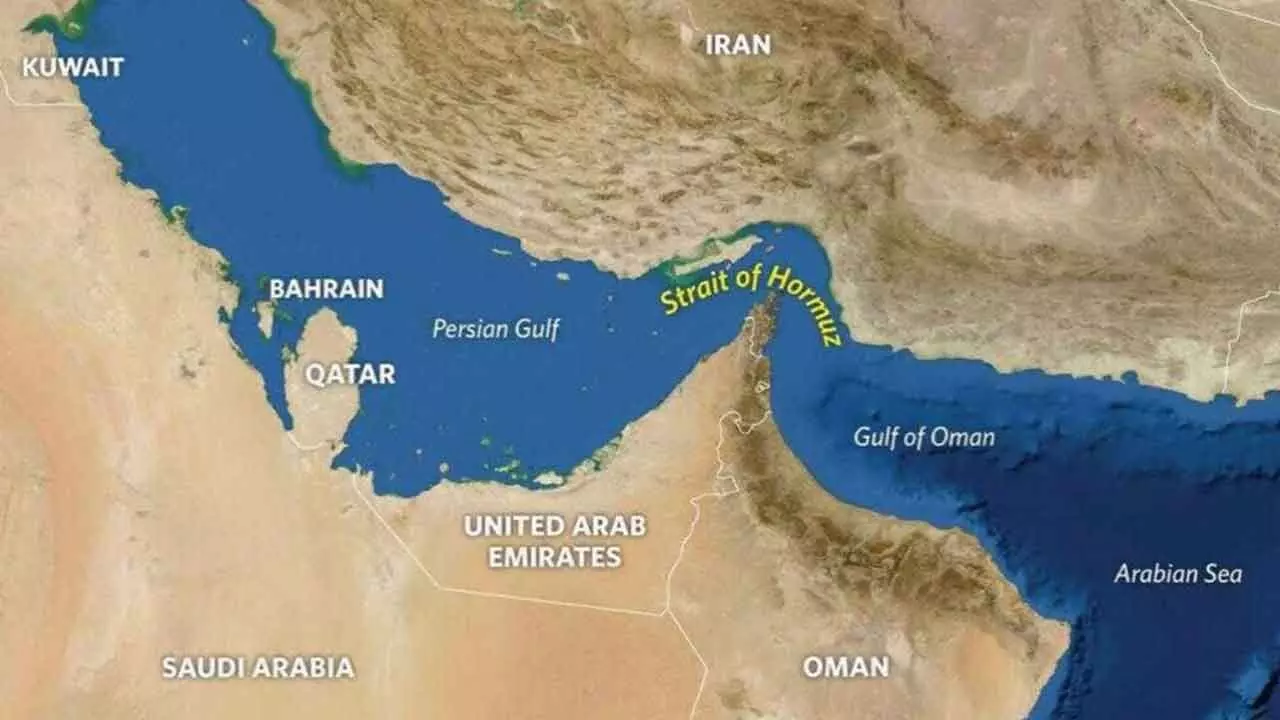Iran's Strait of Hormuz Threat: A Double-Edged Sword Risking Global Energy Chaos, Particularly for Asia
Iran's latest threat to close the Strait of Hormuz, a vital global oil chokepoint, following intensified strikes on its nuclear facilities, could backfire significantly. Experts warn this "suicidal" move would cripple Iran's own fuel imports and plunge major energy consumers like India and China into severe economic turmoil.
Iran's Strait of Hormuz Threat: A Double-Edged Sword Risking Global Energy Chaos, Particularly for Asia

The recent escalation of tensions in the Middle East has seen Iran issue a stark warning: the potential closure of the Strait of Hormuz. This narrow maritime passage, an undisputed linchpin for global oil trade, has become a focal point of concern following increased strikes on Iranian nuclear facilities, reportedly by the United States and Israel. However, a closer look at the intricate web of global energy dynamics suggests that this audacious threat could inflict more self-harm on Tehran than it would on its perceived adversaries.
Former Pentagon official Michael Rubin has minced no words, branding Iran’s threat as "suicidal." His reasoning is compelling: Iran, despite its vast oil reserves, remains surprisingly dependent on imports for its domestic fuel consumption, including crucial gasoline supplies. A blockade of the Strait of Hormuz, he argues, would effectively sever the very supply lines essential for Iran's own economic stability.
The sheer volume of oil traversing the Strait daily underscores its global significance. Approximately 20 million barrels of crude oil pass through this chokepoint every 24 hours. While Western nations certainly rely on this flow, the impact would be disproportionately felt in Asia, which consumes a staggering 84% of the oil transiting Hormuz. The lion's share of this goes to the industrial powerhouses of China and India. For both these burgeoning economies, any prolonged disruption in Hormuz would unleash a cascade of devastating effects: rattling energy security, stifling industrial output, and igniting widespread market volatility.
Silent Stakeholders, Heavy Influence: China and India
China stands as Iran’s primary trading partner and, critically, the largest buyer of Iranian oil. Despite Beijing's public silence on the matter, analysts firmly believe that extensive diplomatic efforts are likely underway behind the scenes. China's enormous investments in Iranian infrastructure, including the strategic Xi’an-to-Tehran railway line, are deeply intertwined with the success of its ambitious Belt and Road Initiative. A complete blockade of Hormuz would not only disrupt essential oil imports but also create crippling bottlenecks in these crucial logistical chains, making a volatile region decidedly "not conducive to business" for Beijing.
India, too, finds itself walking a similar tightrope. While New Delhi has diligently diversified its oil sources, sourcing more crude from Gulf nations like Iraq and Saudi Arabia, any significant regional flare-up in the Strait directly impacts shipping costs, insurance premiums, and refinery margins. Ultimately, these increased expenses would translate into higher costs for Indian consumers, fueling inflationary pressures back home. India relies on the Strait of Hormuz for around 40-50% of its crude oil imports, with major suppliers like Iraq and Saudi Arabia utilizing this route. While India has strategically increased its imports from other regions like Russia and the US to diversify, a significant disruption would still present a major challenge.
High Stakes, Limited Gains: A Risky Gambit
Military experts are quick to point out that physically closing the Strait is far more complex than issuing a threat. While Iran's navy could certainly harass ships or deploy mines, sustaining a long-term blockade would undoubtedly provoke a wider, potentially devastating, military confrontation. Moreover, existing alternate routes, such as the Saudi-UAE pipelines that bypass a portion of the Strait, offer only limited relief to global markets and simply cannot compensate for the massive volumes that pass through Hormuz daily.
Perhaps more telling is the fact that even Iran’s allies stand to lose immensely. Tehran might intend to project strength, but the sustained economic pressure from key partners like China and India could ultimately compel it to de-escalate. While these nations might publicly refrain from direct criticism, their private diplomatic leverage is considerable and should not be underestimated.
Former Pentagon official Michael Rubin views this latest threat as less about genuine naval action and more about political posturing. Faced with biting international sanctions and growing internal dissent, Iran’s leadership may be attempting to project an image of power to both domestic and regional audiences. However, this is a perilous game, particularly when your largest customers and their critical energy lifelines are so heavily dependent on uninterrupted supply.
As the world watches the sensitive waters off Iran’s coast, the potential for a single misstep to ignite a full-blown global energy crisis remains disturbingly real. The paradoxical challenge for Tehran is that the very countries it relies on for its economic survival are precisely those most likely to push back – perhaps quietly, but with undeniable resolve – if this dangerous line is crossed. The coming days will likely reveal whether this remains a war of words or spirals into an economic freefall that no one, least of all Iran, truly desires.

